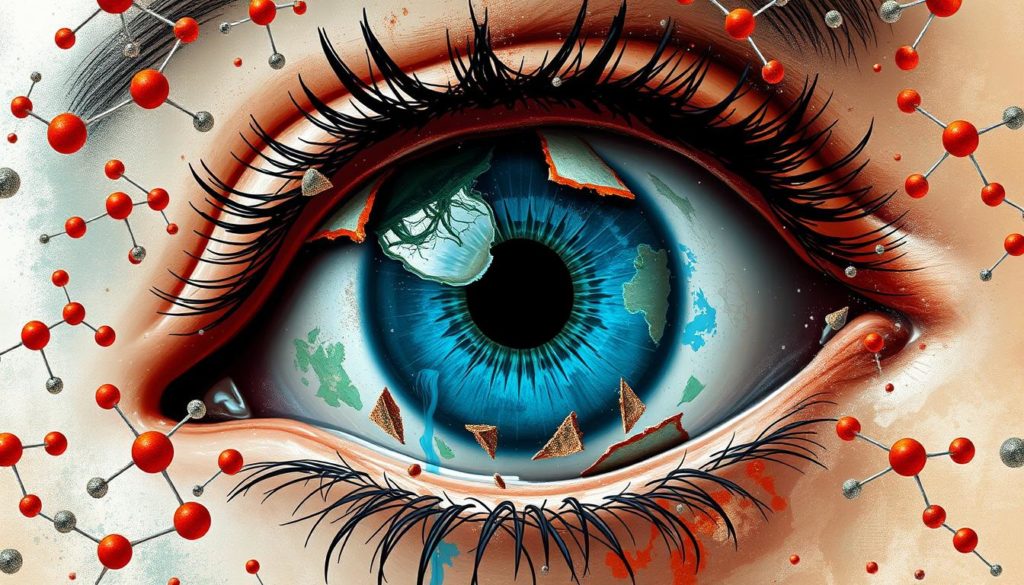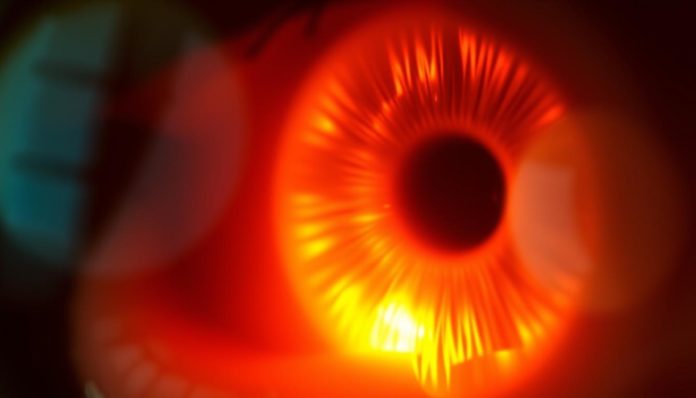Did you know that eating more lutein and zeaxanthin can make your vision better in dim light? These nutrients are key for eye health. They help slow down age-related eye problems and lower the risk of cataracts.
Ultraviolet rays can harm your eyes a lot. But, lutein and zeaxanthin act like natural sunglasses. They block these harmful rays and protect your vision. These antioxidants are vital for keeping your eyes healthy.
Want to increase your lutein and zeaxanthin levels? You can do it through food and supplements. Keep reading to find out how to improve your vision with these important nutrients.
Understanding Lutein and Zeaxanthin
Lutein and zeaxanthin are key carotenoids that protect the eyes. They give the macula its yellow color and shield the retina. These nutrients are vital for eye health.
What are they?
Lutein and zeaxanthin come from plants and are important for the eyes. They are found in the retina, especially in the macula. This area is key for clear central vision. These nutrients protect vision by blocking harmful blue light and fighting oxidative stress.
Importance in eye health
These antioxidants are crucial for eye health. They filter out blue light to protect the retina’s photoreceptor cells. This helps prevent eye diseases like age-related macular degeneration (AMD). Eating foods rich in these nutrients is key for good vision and eye health.

Sources in nature
Nature is full of these essential nutrients. You can find lutein and zeaxanthin in green leafy veggies like kale and spinach. Other sources include orange pepper, egg yolks, and corn. Adding these foods to your diet helps you get enough of these important nutrients.
Role of Antioxidants in Eye Health
Antioxidants like lutein and zeaxanthin are key for keeping our eyes healthy. They fight off harmful compounds to protect our eyes.

Protecting against oxidative stress
Oxidative stress happens when our body has too many free radicals and not enough antioxidants. The retina is very sensitive to this stress. Antioxidants help balance things out by stopping free radicals from causing damage.
How they combat free radicals
Free radicals are unstable molecules that can harm our cells and DNA. Antioxidants like lutein and zeaxanthin stop this by giving up their electrons. This action keeps our eye cells safe and lowers the risk of eye diseases.
| Antioxidant | Role in Eye Health |
|---|---|
| Lutein | Protects the retina from oxidative stress and enhances vision. |
| Zeaxanthin | Supports ocular health by combating free radicals and maintaining cellular integrity. |
Getting Lutein and Zeaxanthin from Your Diet
Eating foods rich in lutein and zeaxanthin can boost your eye health. These nutrients are found in many vegetables and other foods you eat every day.
| Food | Lutein Content (mg/100g) | Zeaxanthin Content (mg/100g) |
|---|---|---|
| Kale | 39.6 | 0.19 |
| Spinach | 12.2 | 0.39 |
| Sweet Corn | 0.7 | 2.4 |
| Eggs | 0.3 | 0.28 |
Eating these foods regularly can increase the amount of lutein and zeaxanthin in your body. There’s no official daily amount needed, but eating about 10 mg of lutein and 2 mg of zeaxanthin a day is good for your eyes.
Eye supplements can also help meet these levels. Eating these foods and taking supplements is a great way to protect your vision.
The Benefits of Lutein and Zeaxanthin for Vision
Lutein and zeaxanthin are key for eye health. They act as natural filters against blue light. These carotenoids are crucial for keeping the macula healthy, which helps prevent eye diseases as we age.
They also help reduce glare and improve vision in dim light. Adding lutein and zeaxanthin to your diet can protect your eyes over time. This reduces the risk of cataracts and keeps the macula healthy.
By eating these nutrients regularly, you boost your eyes’ defense. Studies show that lutein and zeaxanthin greatly improve vision and eye health. They play a big part in how well we see and keep our eyes healthy.
Lutein and Zeaxanthin in Vegetables
Eating high-content lutein vegetables is great for your eye health. Lutein and zeaxanthin are found in many popular veggies.
High-content vegetables
Leafy greens like kale, spinach, and collard greens are packed with these important carotenoids. Broccoli, corn, and bell peppers are also good sources. These veggies give you lots of lutein and zeaxanthin for good vision.
Recommended daily intake
There’s no official daily amount needed for lutein and zeaxanthin. But, experts say to get about 10 mg of lutein and 2 mg of zeaxanthin each day. You can get this by eating a mix of leafy greens and colorful veggies like corn every day.
Eye Diseases Prevented by Lutein and Zeaxanthin
Lutein and zeaxanthin are key for keeping eyes healthy. They stop or slow eye diseases from getting worse. These nutrients protect eyes from damage caused by oxidative stress.
Age-related macular degeneration
Age-related macular degeneration (AMD) is a big cause of vision loss in older people. Studies show that taking lutein and zeaxanthin can make the eyes healthier. This can improve how well you see and lower AMD risk. Learn more about how these carotenoids.
Cataracts
Lutein and zeaxanthin are crucial for preventing cataracts. They build up in the lens, shielding it from UV damage. Eating these nutrients or taking supplements can greatly reduce cataract risk. This means you can keep seeing clearly as you get older.
Other Eye Conditions
Lutein and zeaxanthin also help with other eye problems like retinal detachment and diabetic retinopathy. Their antioxidant effects keep retinal tissues strong. This boosts overall eye health.
Supplement Options for Eye Health
For those who can’t get enough lutein and zeaxanthin from food, eye supplements are a good option. These supplements help support eye health by giving the body the nutrients it needs.
Popular brands and their contents
Brands like EyePromise Restore, Ocuvite, and ICaps Eye Vitamin offer eye supplements. They include nutrients like zinc, vitamins A, C, and E. These supplements are made to improve eye health and are known for their quality.
Recommended dosages
The recommended daily intake of lutein and zeaxanthin is 10 mg and 2 mg, respectively. Following these guidelines helps get the most benefits while staying safe.
Potential side effects
Ocular supplements are usually safe when taken as directed. But, taking too much might cause harmless skin yellowing. Always talk to a healthcare provider before starting any supplements. They should not replace a healthy diet.
| Brand | Key Contents | Recommended Dosages (Lutein & Zeaxanthin) | Potential Side Effects |
|---|---|---|---|
| EyePromise Restore | Lutein, Zeaxanthin, Vitamins A, C, E, Zinc | 10 mg & 2 mg | Skin yellowing (harmless) |
| Ocuvite | Lutein, Zeaxanthin, Omega-3, Vitamins C, E, Zinc | 10 mg & 2 mg | Skin yellowing (harmless) |
| ICaps Eye Vitamin | Lutein, Zeaxanthin, Vitamin E, Zinc | 10 mg & 2 mg | Skin yellowing (harmless) |
How Lutein and Zeaxanthin Work Together
Lutein and zeaxanthin are similar but have unique traits. They belong to the carotenoid family. Their slight differences in atomic arrangement affect their health benefits for the eyes.
Chemical similarities and differences
Lutein and zeaxanthin look alike but have small molecular differences. These differences affect how they work in the eye. This synergy boosts eye health. Lutein is found more in the outer eye parts, while zeaxanthin is in the central area.
Combined benefits
Lutein and zeaxanthin work together to protect the eyes. They neutralize harmful free radicals. This reduces the risk of eye diseases like macular degeneration and cataracts.
This synergy also helps recycle glutathione, another antioxidant. It fights oxidative damage.
| Parameters | Lutein | Zeaxanthin |
|---|---|---|
| Primary Location in Eye | Peripheral Retina | Macular Region |
| Key Benefits | Reduces oxidative stress | Protects central vision |
| Joint Action | Enhances overall antioxidant protection | |
Lutein and zeaxanthin work together to protect the eyes from damage. Their combined effects offer strong defense against oxidative damage.
Importance of a Balanced Diet for Ocular Health
A balanced diet for vision is more than just eating lutein and zeaxanthin. It means eating a variety of foods that help your eyes stay healthy. Adding these nutrients to your meals can really help your eye health.
Complementing with other nutrients
To keep your diet eye-friendly, add nutrients that help eye health. Omega-3 fatty acids in fish are key for the retina’s health. Vitamins C and E, along with zinc, fight off eye damage from stress. Citrus fruits, nuts, and seeds are great for these nutrients.
These foods boost the effects of lutein and zeaxanthin. They give you full eye nutrition.
Foods to focus on
Eating colorful fruits and veggies makes your diet varied and full of important vitamins and minerals. Dark leafy greens like spinach and kale are packed with lutein and zeaxanthin. Fish, eggs, and nuts give you protein and more eye health benefits. Here’s a list of foods good for your eyes:
- Fish (rich in Omega-3 fatty acids)
- Oranges and other citrus fruits (high in Vitamin C)
- Almonds and sunflower seeds (rich in Vitamin E)
- Dark leafy greens (high in lutein and zeaxanthin)
- Eggs (contain Vitamin A, lutein, and zeaxanthin)
By eating these foods, you can make a diet that supports and keeps your eyes healthy.
Recent Studies on Lutein and Zeaxanthin
New studies show how lutein and zeaxanthin are key for eye health. They help prevent eye problems like age-related macular degeneration and cataracts. Eating more of these antioxidants can improve eye health and vision.
Key Findings
Lutein and zeaxanthin are good for your brain and eyes. They are found in the eye’s macula and help with better thinking, less glare, and clearer vision. A study showed they’re good for both eye and brain health in all ages, especially in kids and older people.
Implications for Future Research
These studies suggest more research is needed. Scientists want to learn how eating more lutein and zeaxanthin can prevent eye problems. This research could lead to new treatments for eye health.
Practical Takeaways
Adding lutein and zeaxanthin to your diet is a good idea. Eat foods like kale, spinach, and corn for these carotenoids. Supplements can also help meet your needs. Eating foods rich in these antioxidants can help keep your eyes healthy for a long time.
FAQ
What are lutein and zeaxanthin?
Lutein and zeaxanthin are antioxidants found in the eyes. They are in the lens, retina, and macula. These carotenoids help keep vision healthy by blocking harmful blue light and fighting off free radicals.
How do lutein and zeaxanthin benefit eye health?
These antioxidants protect the eyes from high-energy light waves like ultraviolet rays. They help improve vision in low light or glare. They also slow down age-related eye diseases and lower the risk of cataracts.
What are common dietary sources of lutein and zeaxanthin?
You can find lutein and zeaxanthin in green leafy veggies like kale and spinach. Yellow and orange fruits such as corn and orange peppers are also good sources. Egg yolks and broccoli are other places to get these nutrients.
Do I need to take supplements for lutein and zeaxanthin?
A diet rich in these nutrients is best, but supplements can help if you don’t get enough. Brands like EyePromise Restore, Ocuvite, and ICaps Eye Vitamin offer supplements with lutein, zeaxanthin, and other eye-friendly nutrients.
What is the recommended daily intake of lutein and zeaxanthin?
Experts suggest getting 10 mg of lutein and 2 mg of zeaxanthin daily for good eye health. There’s no official RDA, but this amount is considered beneficial.
Can lutein and zeaxanthin prevent eye diseases?
Yes, research shows that lutein and zeaxanthin can help prevent or slow eye diseases. This includes age-related macular degeneration, cataracts, and possibly diabetic retinopathy.
Are there any side effects of taking lutein and zeaxanthin supplements?
Supplements are usually safe. Taking too much might make your skin look yellow. Always follow the recommended dosage.
How do lutein and zeaxanthin work together in eye health?
Lutein and zeaxanthin work well together to protect the eyes. Taking them together offers better protection against free radicals than one alone. They also help recycle glutathione, boosting overall eye health.
What other nutrients are important for eye health?
Besides lutein and zeaxanthin, omega-3 fatty acids, vitamins C and E, and zinc are key for eye health. You can find these in fish, citrus fruits, nuts, seeds, and many colorful fruits and veggies.
What have recent studies revealed about lutein and zeaxanthin?
Recent studies show that lutein and zeaxanthin are crucial for eye health. They help manage and prevent eye diseases like age-related macular degeneration and cataracts. Eating more of these antioxidants can greatly improve eye health, and research is ongoing to learn more about their benefits.


